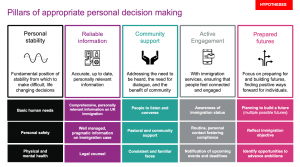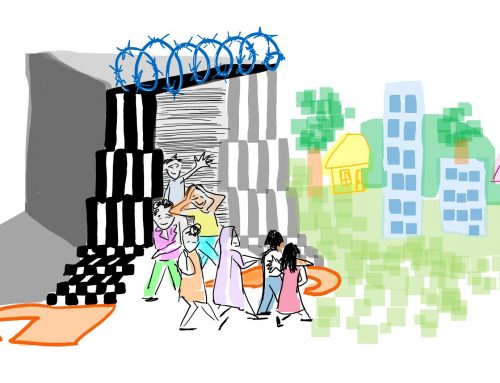How will migrants and civil society organisations shape the alternatives pilots? – ATD Blog 2
19 July 2019
In July 2018, the Home Secretary announced a new community-based alternative to detention pilot for vulnerable women detained in Yarl’s Wood or at risk of detention. We have been demanding that the Home Office work with civil society on alternatives, so we welcomed this breakthrough moment, but also recognised that this was only a first step.
In this blog series, we will piece together the story of the Detention Forum’s work on alternatives to detention, which began almost 10 years ago, and analyse this latest development in the work challenging immigration detention.
========================================
In April this year, a representative of the UK Home Office delivered a presentation on their alternative to detention (ATD) pilots to a packed conference room in Strasbourg. The International Conference on Effective Alternatives to the Detention of Migrants, jointly organised by the Council of Europe, the European Commission and the European Migration Network, was a milestone event in the history of alternatives advocacy. Over 200 participants were in attendance, mainly government representatives from Council of Europe and European Union member states, demonstrating a growing interest in alternatives across the region.
It is fair to say that the UK presentation attracted much interest from seasoned alternatives advocates present, who agreed that it was one of the highlights of the conference. Many welcomed the UK Home Office representative’s emphasis on quality case management, plans to support individuals in the community to explore all options available and not just return, commitment to co-design the process with NGOs and to learn from the process to inform both the pilots and the wider immigration system.
But in the UK itself, these pilots, and indeed the concept of alternatives, have received little attention so far.
In spring 2018, a few months before the Sajid Javid’s announcement of the alternatives pilots, the Home Office started exploring the idea of community-based alternatives to detention with groups and organisations offering support to migrants in the community, through workshops co-hosted with UNHCR and further bi-lateral meetings.
The Detention Forum and some of our members and colleagues cautiously participated in these opportunities. We shared with the Home Office what we believe to be the key principles that underpin successful and effective alternatives, based on our years exploring the issue. Additionally, we contributed to a small one-day workshop for the Home Office and several NGOs in October last year, on case management, the process of setting up alternatives pilots and monitoring and evaluation.
What is interesting and challenging about discussion of community-based alternatives is that it becomes no longer exclusively about detention and what happens inside detention centres: the discussion touches upon all elements of the migration system in the community, including provision of information and advice, access to general and specialist support, including legal advice, availability of housing and welfare support. It rests on the recognition that detention happens as part of migration governance system, and systemic change is necessary for detention to be reduced.
The final Home Office alternatives pilot framework makes interesting reading:
- The pilots test the hypothesis of ‘whether increased collaboration with faith and community groups at a local level can result in better outcomes for migrants through the faster resolution of their cases, whether that results in their integration in the UK or departure’;
- The pilots’ hypothesis of ‘pillars of appropriate personal decision making’ is in some part compatible with the principles of the International Detention Coalition’s Community, Assessment and Placement (CAP) model;

This is taken from the Home Office presentation material shared in Strasbourg on 4 April 2019, available at https://www.coe.int/en/web/special-representative-secretary-general-migration-refugees/presentations
- There will be a total of four pilots, each running for two years to ‘ensure meaningful results’. They will ‘test different aspects of the decision making pillars, with different cohorts of migrants’, targeting irregular migrants as well as asylum seekers. However, people with previous criminal convictions will not be included in the pilots;
- The Home Office ‘anticipate that supporting migrants in this way will lead to a reduction in the need for detention’;
- Intended outcomes of the pilots are as follows;
-
Fewer people in the UK without the right permissions and protections
-
Detention is only used as a last resort (and all other options have been tried)
-
Fewer people face exploitation or suffer hardship due to being unable to find immigration resolution
-
Those with irregular immigration status reach a positive personal outcome sooner (regularise or leave) – quicker case resolution
-
Of those who leave, more people leave voluntarily (without any enforcement action)
-
Reporting changes
-
More people comply with the immigration system process (greater engagement)
-
People feel they have been treated fairly and with respect and dignity
-
Enforcement action is more tightly focussed and used only where absolutely necessary and appropriate.
- There will be both quantitative and qualitative evaluation, including a user-centred approach which sees the pilots from migrants’ point of view. ‘The findings for the evaluation of the pilots will be examined within the context of the wider changes to detention across the Home Office.’
It is within this framework that the first pilot, run by Action Foundation in Newcastle, started in January 2019. We understand that the process of identifying implementors of the second pilot began in early June. The Immigration Minister, Caroline Nokes, recently confirmed that the second pilot will be starting in autumn 2019.
I can report progress towards the second pilot. There is interest from several credible potential delivery partners, and we expect to have our chosen delivery partner by August, enabling the second pilot to commence in the autumn. All irregular migrants will be in scope of that project.
Unlike the Home Office’s previous alternatives pilots, this framework seems to suggest that the pilots are not exclusively focused on return but are designed to reduce the need for detention. By placing positive outcomes for migrants at the centre, whether integration or return, and acknowledging the importance of fairness, dignity and respect, this small initiative might be a first step towards the Home Office seeing migrants as people.
There is long-term potential here not just to reduce detention but also to change the way that the Home Office generally treats and interacts with individuals. The risks are that these pilots are rushed and morph into another tick-box removal machine, or that any positive learning is lost on the rest of the Home Office.
If these pilots are to succeed, they will need to learn from previous experience of alternatives, what worked and what didn’t.
We believe it is critical for the Home Office to focus on the importance of high quality, independent case management – a crucial element of successful alternatives around the world. We recommend regular qualitative monitoring and evaluation to inform the pilots as they develop, to maximise learning from the process. We demand that the Home Office involve migrants themselves in designing the pilots and the monitoring and evaluation process.
We also urge the Home Office to give some serious thought to what we considered to be an essential ingredient of a fair and humane migration system: trust. Through years of talking to interested NGOs and migrants about alternatives, it was stressed again and again how the current lack of trust can undermine any future alternatives attempts. It doesn’t need to be spelled out that migrants and NGOs’ experience of the Home Office has often been poor and civil society’s relationship with the Home Office has been fraught.
It is likely to take a long time to build that trust, but this alternatives initiative could be an important start. We strongly recommend to the Home Office and UNHCR, who is also involved in leading this pilot initiative, to establish a clear communication pathway through which information about the pilots is shared regularly and transparently with all relevant stakeholders.
We also recommend that a reference group, composed of representatives with relevant expertise, be set up as a matter of urgency to offer external views on the progress of the pilots. It is concerning that six months have already passed since the first pilot’s commencement, but there is no sign of the reference group. We need these mechanisms in place so that migrants and civil society organisations can constructively engage with these pilots development and ensure any reform that happens as a result of the pilots is going to be a meaningful one.
In our next blog, we will look at the first pilot for vulnerable women in Yarl’s Wood, delivered by Action Foundation.
Eiri Ohtani @EiriOhtani





